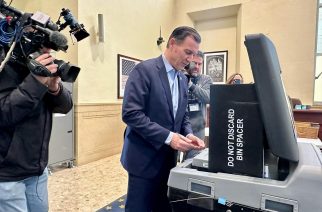Pension forfeiture, spending disclosure rules part of last-minute reform package
A last-minute ethics reform deal reached by the governor and legislative conference leaders would strip the pensions of any public officer who is convicted of corruption.
Under the agreement reached late Friday, any public officer who is convicted of corruption will be prohibited from collecting a pension earned during public service.
Because the proposed reform would amend the state Constitution, the Legislature would have to adopt the resolution again next session and the voters would have to approve the referendum on a statewide ballot before it goes into effect.
The pension forfeiture rule is especially apropos this year. Just last month, both former Senate Majority Leader Dean Skelos and former Assembly Speaker Sheldon Silver were sentenced in separate federal corruption cases that began in January 2015. In each of the cases, Skelos and Silver used their offices and their positions atop the state Legislature for personal gain.
Silver was sentenced to 12 years in prison for extortion, money laundering and honest services fraud. Among other crimes, he accepted large payments from a law firm that specialized in reducing property taxes for New York City landlords and developers. Skelos was sentenced to five years in prison for awarding a $12 million state contract to a company that hired his son.
Under the old rules, both Silver and Skelos will receive their taxpayer-funded state pensions.
“The people of New York state expect and deserve the highest ethical standards from their elected officials and when the public’s trust is abused it is our job to restore their faith in government,” said Sen. Jeff Klein, D-Bronx, a member of the Independent Democratic Conference, which caucuses and often votes with the Senate’s Republican conference. “Today, we send a strong message that if a public official commits a crime while earning a living on the taxpayers dime we will strip them of their pensions.”
Because the pension forfeiture rule would amend the state Constitution, the Legislature would have to pass the resolution again in 2017 before the people could vote on it in the form of referendum on a statewide ballot. There is no guarantee lawmakers will pass the same measure again next year.
The pension forfeiture rule was one of five reforms adopted in the closing hours of session. Under the agreement, independent spending groups may not be formed by candidates or run by the candidate’s family members or former staffers. The agreement also requires independent spenders to report the identity of anyone exerting control over the group, as well as any former staffers and immediate family members of candidates.
Albany’s four men in a room — Gov. Andrew Cuomo, Senate Majority Leader John Flanagan, Assembly Speaker Carl Heastie and Klein — say the deal reached late Friday night would strengthen election, lobbying and ethics enforcement laws.
The ethics reforms, which were announced by the Governor’s Office, would strengthen disclosure requirements for lobbyists and increase penalties for lobbying violations by requiring lobbyists to relinquish profits received from illegal contingency fee arrangements.
But government watchdogs say the reforms announced in the final hours of the 2016 session only dance around the edges of real reform.
“Last night in darkness, the Legislature passed what it will call ‘meaningful reform’ including tightening the coordination rules determining what is or is not an independent expenditure, disclosure of political consultants who also act as lobbyists, and pension forfeiture,” said Barbara Bartoletti, legislative director of the League of Women Voters of New York State. “These minimal reforms, unfortunately, do not address the core corruption in Albany.”
Good government groups had called for changing a state law that treats limited liability companies like individuals, allowing these companies to make larger contributions to candidates and political parties. Corporations can donate $5,000 to candidates while LLCs are allowed donate more than $60,000 to candidates. Under the loophole established by the Board of Elections in 1996, donors hoping to influence state lawmakers and other officials can establish multiple fake companies for the purpose of donating nearly limitless campaign financing to the governor, legislators or other elected officials.
Groups such as Reinvent Albany, The New York Public Interest Research Group, the League of Women Voters’ New York chapter, Citizens Union, Common Cause New York and the Brennan Center for Justice had also pushed for better regulation of the outside income of public officials and increasing transparency in the budget-making process. They say these three reforms together would reduce the kinds of corruption cases that have plagued Albany for decades.
“Again, the Legislature has left Albany following its ‘Watergate moment’ by avoiding the most critical reforms such as closure of the LLC loophole, increased disclosure of discretionary funding and removing the pay-to-play culture by lowering contribution limits,” said Bartoletti, referring to the arrest and sentencing of Silver and Skelos. “Shame on them.”
Despite lukewarm responses from good-government groups and even fellow lawmakers, Cuomo and legislative conference leaders are touting “first-in-the-nation” legislation to curb the power of independent expenditure campaigns unleashed by the 2010 Supreme Court case Citizens United vs. Federal Election Commission.
“Citizens United is one of the worst Supreme Court decisions in history and in just six years has already had a profoundly corrosive impact on our democracy. It decimates the right to free speech by allowing it to be eclipsed by paid speech, devaluing the right of individuals to participate in the political system,” Cuomo said. “For the first time, independent expenditure groups and PACs will be required to adhere to unprecedented disclosure requirements, and New York will have the nation’s strongest rules defining and governing coordination and independence.
The Supreme Court’s 2010 Citizens United decision permitted spending unlimited amounts of money on elections, revoking what little power ordinary citizens had left in the electoral process.
“Until the Supreme Court reverses its decision or Congress acts to change the law, states should follow New York’s lead and use their powers to rein in the devastating impact of Citizens United,” Cuomo added. “This reform package includes new disclosure requirements and stiffer penalties that will shine a light on what now is the shadowy intersection of government, lobbying and political consulting. Together, this legislation will help bring more transparency, trust and faith to state government.”
Under the agreement, independent spending groups may not be formed by candidates or run by the candidate’s family members or former staffers. The agreement also requires independent spenders to report the identity of anyone exerting control over the group, as well as any former staffers and immediate family members of candidates.
Specifically, the agreement would strengthen the definition of “coordination” between independent expenditures and candidates and define multiple scenarios as expressly prohibited coordination such as when the spending entity was formed by the candidate or the candidate’s agents; The candidate or his agents fundraises for the spending entity; the spending entity employs the candidate’s former staffers; or if the spending entity is operated by a member of the candidate’s immediate family.
The deal would establish a civil penalty on independent expenditure committees and political action committees for knowing and willful violations; require persons making independent expenditures to register as independent expenditure; require campaign housekeeping accounts to be deposited in segregated accounts to increase transparency on spending; and prohibit independent expenditure committees from contributing directly to candidates.
The deal would also require that a campaign account must be wound down within two years of the candidate or elected official’s death and provides for several legitimate uses for moneys in accounts that are wound down. These uses include returning donations to the contributor; donating the funds to a charity; donating the funds to SUNY or CUNY; donating the funds to the state general fund; or contributing the funds to a candidate or party.
For the first time, political consultants providing services to sitting elected officials or candidates for elected office and who also have clients with business before the state or a locality would be required to register with the state and disclose their clients.
But these proposed changes weren’t universally praised. Some lawmakers, for example, had called for term limits for legislative leaders and committee chairs; greater oversight of the state’s economic development programs and discretionary spending; replacing the Joint Commission on Public Ethics with an ethics watchdog not controlled by political appointees; and an open and transparent budget process that welcomes input from all.
“Yet again, Albany failed to scratch the surface of substantial ethics reform,” said Assembly Republican Conference leader Brian Kolb, R-Canandaigua. “As we end the 2016 legislative session, we leave Albany in the same condition as when we began — functionally broken. Despite early promises for reform, lawmakers turned a blind eye to public demand and urgent need for meaningful change.










